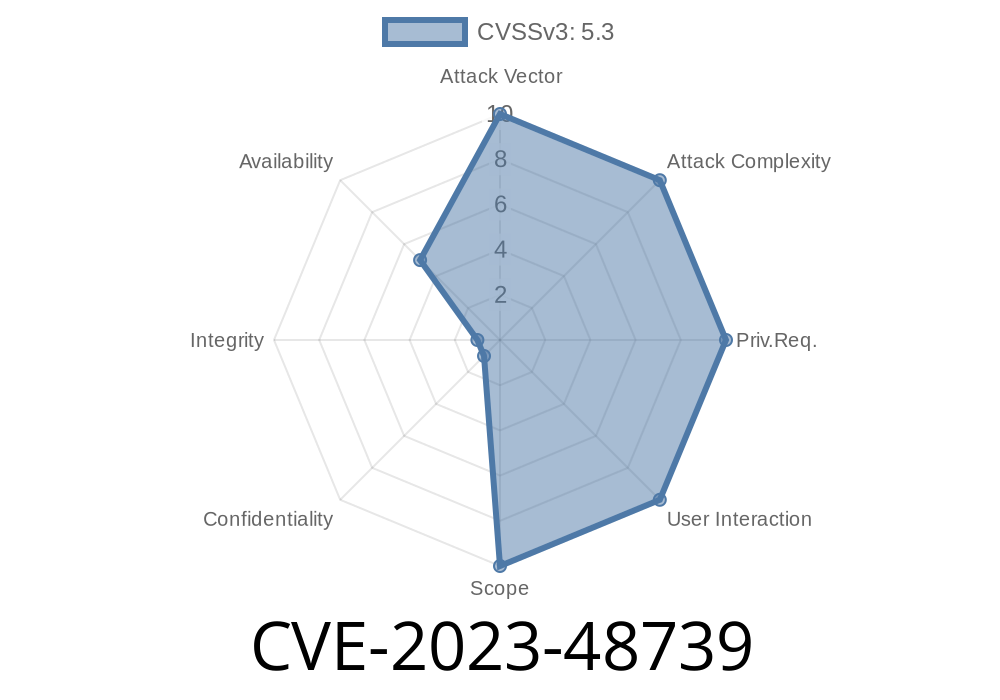In late 2023, a significant security vulnerability was discovered in the popular Porto Theme for WordPress and Magento: CVE-2023-48739. This bug impacts websites using Porto Theme versions before 2.12.1, exposing them to potentially serious attacks due to weak access control. In this article, we’ll explain the vulnerability in simple terms, show how an attacker might exploit it, and share how to protect your site.
What Is CVE-2023-48739?
CVE-2023-48739 is a missing authorization flaw in Porto Theme. In short, certain functions built into the theme do not sufficiently check who is trying to use them. This means unauthorized users could call these functions and perform actions they shouldn’t be able to—like changing settings or accessing sensitive information.
This vulnerability is caused by incorrectly configured access control security levels.
How Does It Happen?
Many WordPress or Magento themes use built-in functions for admin tasks (like changing how your site looks or works). These functions are supposed to be called only by trusted, logged-in users (like admins). But if the theme doesn’t properly check who’s calling the function, anyone—including unlogged visitors or hackers—could access it if they know how.
Here’s what insecure code might look like
// Example vulnerable code in Porto Theme
function porto_theme_change_setting() {
// Missing: check that user is admin
$setting = $_POST['setting'];
update_option('porto_theme_setting', $setting);
echo "Setting changed!";
}
add_action('wp_ajax_porto_change_setting', 'porto_theme_change_setting');
What’s wrong?
There’s no check to see if the user is allowed to change this setting! Anyone who knows how to send a POST request to this action (porto_change_setting) could change settings.
How Should It Be?
function porto_theme_change_setting() {
// GOOD: Only allow admins!
if (!current_user_can('manage_options')) {
wp_die('Unauthorized!');
}
$setting = $_POST['setting'];
update_option('porto_theme_setting', $setting);
echo "Setting changed!";
}
add_action('wp_ajax_porto_change_setting', 'porto_theme_change_setting');
Exploit Scenario
Let’s see how a real attacker could take advantage.
Craft a Request:
The attacker sends a HTTP POST request to the identified endpoint, supplying malicious or altered data. Here’s a sample using curl (a command line tool to make web requests):
`bash
curl -X POST -d "setting=new_value" https://targetsite.com/wp-admin/admin-ajax.php?action=porto_change_setting
Result:
Even if the attacker is not logged in, the action works—changing site settings, making unauthorized modifications, or possibly exposing sensitive info.
References
- NVD - CVE-2023-48739
- Porto Theme Official Site
- WPScan – Porto Theme Unauthenticated Settings Change
- WordPress Codex: AJAX in Plugins
Check Customizations
If you or your developer customized any functions, make sure all sensitive actions check user capabilities:
wp_die('Unauthorized!');
}
Security Plugins
Use plugins like Wordfence or Sucuri to help monitor for strange activity.
Test Your Site
Use vulnerability scanners like WPScan or Nuclei to double-check you’re safe.
Conclusion
CVE-2023-48739 proves that even premium commercial themes like Porto can have serious bugs that put your website at risk. Fortunately, updating to the latest version or fixing your code stops attackers in their tracks. Always keep your themes up-to-date and review custom code for proper access controls.
Don’t wait—patch today and keep your site safe!
_If you want more details or need help testing your website, leave a comment below or contact your hosting provider._
Timeline
Published on: 01/02/2025 15:15:20 UTC
